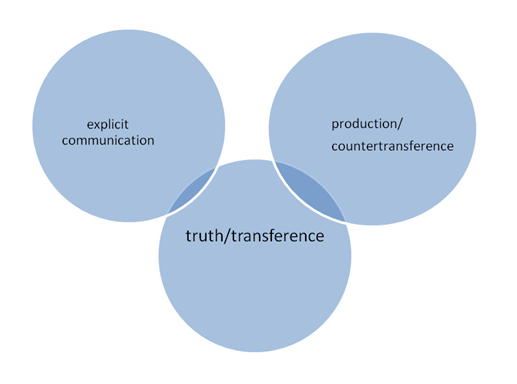Transference is something that we all exercise to some degree at some point in our lives. Let’s explore it and determine the best way to use it. Let’s see what is transference about.
What is Transference?
Transference is the direction of certain feelings or desires for another person to an entirely different person. For example, if an individual were to remind someone of their ex-spouse, they would begin to attribute the spousal feelings of the ex-spouse to that individual. These feelings can be positive or negative.
Often used in psychotherapy, transference helps a therapist understand a patient’s unconscious mental process.

In general, transference is, in essence, a serious attempt, usually introduced by our subconscious, to produce temporary relief from the pain or anxiety of unsatisfied needs, unresolved conflicts, or emotional traumas from the past. It is a conduct that results from the desire to either deny or soothe past emotional pain through the present-day utilization of a substitute replacement.
Another form of transference is an excessive requirement for complementary recognition from individuals who are in positions of authority (parents, pastors, teachers, bosses, etc.). We often seek this recognition as a positive verification, desiring to mitigate the pain from prior disappointments where we felt overlooked or unappreciated by a significant person in our lives.
Not receiving this recognition in a timely fashion can trigger a negative emotional recall, dragging up many of the feelings of disappointment from the original circumstances. This dissatisfaction then provides the incentive for the injured soul to vicariously “punish” the person[s] from the past by subjecting the individual in the present to a barrage of judgmental thoughts, words, or actions.

The unsettled subconscious mind often motivates an individual that is in denial to search for solace for unresolved past disappointments by punishing with anger or demanding unrealistic indemnifying affection from people at present. Using the transference mechanism as a tool, one may attempt to gain to some degree of compensatory relief or satisfaction through their present-day relationships.
An individual who is transferring is in denial and is usually unaware that issues of the past are triggering their behavior. Transference allows one to remain in denial, allowing them to temporarily suppress or relieve the pain associated with the original circumstance.
With the opportunity afforded by the transference mechanism, such a victim finds a temporary pressure release by blaming, manipulating, and making unreasonable demands of others.
Counter Transference
Counter transference occurs during therapy when therapists redirect their own personal feelings or desires onto their patients. This occurrence may or may not be a reaction to a patient’s transference.
The Biblical Perspective
Although transference is often embedded in hurtful events from the past, not all rationale for transference is located deep in the subconscious. There are examples of this in the Scriptures.
For example, in an attempt to justify his sinful actions in the garden, when God questioned Adam, he said, in Gen 3:12, And the man said, The woman whom thou gavest to be with me, she gave me of the tree, and I did eat.

Another occasion, also in Genesis, is Cain’s anger. When God did not accept his offer but accepted Able’s, he killed Able (Gen. 4:1-8).
This tragedy is straightforward transference. Cain, while in the field with Abel, kills him in his anger. Instead of honestly dealing with his anger at God for rejecting his offering, Cain exercises transference and makes Abel into his fall person. His issues were in actuality with God and his own personal shame, but, unwilling to be penitent, he chose to seek relief by directing his anger at someone else. As a result, a life was lost. This action illustrates how damaging transference can be.

One more example in Genesis is Joseph’s brothers, who were angry with their father because he favored Joseph. However, instead of dealing directly with their father, they exercised transference and executed action upon Joseph (Genesis 37:1-24).
One thing to observe with these examples: transference does not solve the problem. It only offers temporary relief and consequences are the result.
Satan, whom the Scriptures describe as the god of this world (2 Cor. 4 4), is busy seducing the world with the illusion that happiness can be achieved solely through human efforts and personal human relationships. Satan’s most effective tool is deception.
Satan presented and promoted the falsehood from the very start that what we truly need and want is available to us without any need for God (Gen. 3:1-5). Satan offers through temptation that we should use anything that is attractive, easily accessible, and appears to be beneficial for immediate personal gratification. Instantaneous self-satisfaction is a particularly appealing objective to man’s sinful nature, and the soul is quite skillful in its application (Exod. 15:22-24; 16:1-3; 16:20; 17:1-7). The fact of the matter is that short-term self-gratification, desired by the exploitation of human relationships, is the ideal result of transference.
Another example is found in Genesis 37:1-24, containing the account of Joseph and his brothers. They hated Joseph because their father favored him.
Joseph’s brothers aimed their anger at Joseph, attempting to find relief from the continuing conflict causing feelings of rejection within. The brothers developed a bitter heart, which can violate many. Therefore, they attempted to destroy him.
Spiritual Transference
Transference may seem complicated. However, most of what may be seen as complexities of transference are nothing more than an unrighteous reliance upon others to fulfill the flesh. By utilizing a dysfunctional psychological mechanism, we use individuals to yield us satisfaction, enjoyment, or relief that is only temporary. This kind of reliance on creature instead of the Creator is simply idolatry. The Scripture exhorts us in Psalm 4:2: “How long, O men, will you turn my glory into shame? How long will you love delusions and seek false gods?”
It doesn’t matter if an individual is punishing with anger or persistently seeking compensatory affection; they have turned to the wrong basis. They are using the wrong approach to achieve any lasting resolution or restoration.
It is important to note that we do have a choice. Looking again at Cain’s situation, God gave him a choice. In Gen 4:6-7, it reads,
6 Then the Lord said to Cain, “Why are you angry? Why is your face downcast?
7 If you do what is right, will you not be accepted? But if you do not do what is right, sin is crouching at your door; it desires to have you, but you must master it.” NIV
God clearly laid Cain’s options out to him. We have the same choices today
God and Transference
There is an answer!
God is the trustworthy source, and the only genuinely effectual method is repentance and forgiveness, which yields freedom from bondage and emotional healing to us by the power of the Holy Spirit when we accept His Son Jesus as Lord and Savior.
Look at what the Scriptures say in Rom 8:10-14
10 But if Christ is in you, your body is dead because of sin, yet your spirit is alive because of righteousness.
11 And if the Spirit of him who raised Jesus from the dead is living in you, he who raised Christ from the dead will also give life to your mortal bodies through his Spirit, who lives in you.
12 Therefore, brothers, we have an obligation — but it is not to the sinful nature, to live according to it.
13 For if you live according to the sinful nature, you will die; but if by the Spirit you put to death the misdeeds of the body, you will live,
14 because those who are led by the Spirit of God are sons of God. NIV
When we yield to the Spirit and God’s wisdom finally opens our minds, and we genuinely abandon our misapplied fleshly resolves, the Holy Spirit begins to heal our hearts from past hurts. However, not by fixing the past but by supernaturally disconnecting us from the effects of the past events. It is these effects that induce us toward temporary compensation through transference.

Therefore, after the Holy Spirit releases us from the distorted desires that originated in past events, we start to grow into the new person we were always meant to be in Christ Jesus (2 Cor. 5:17). When this occurs, we can experience the kind of peaceful, loving relationship with God and man for which humanity was initially designed. This peace is accomplished as we live the resurrection life of Christ in those previously unrepentant, unconverted sections of our hearts.
Then, we no longer allow our lives to be ruled by the persistent deceptions of our love-starved souls. Instead, we can enjoy the satisfaction of our greatest need, a dynamic and intimate love relationship with our Redeemer, the Lord Jesus Christ.
As Jesus said in Matt 11:28-30
28 Come unto me, all ye that labour and are heavy laden, and I will give you rest.
29 Take my yoke upon you, and learn of me; for I am meek and lowly in  heart: and ye shall find rest unto your souls.
heart: and ye shall find rest unto your souls.
30 For my yoke is easy, and my burden is light.
We must exercise transference to Jesus!
Amen
It would be greatly appreciated if you would be so kind as to leave any questions, comments, concerns, and experiences with transference below. You will receive a response.
Blessings!

Hi, great article. There was something you said in the 2nd paragraph that stuck with me. The part about how an individual can remind them of their ex-spouse or something. Can that same principle apply to other people?
I lost my best friend to a house fire back in 2019. Last week I this new job and have been partnered up with this guy who looks like an exact copy of my best friend. Same dress style, same bad smoking habits, he reminds me so much of my best friend, I have wondered things to myself if this is some sort of fate God has set out for me.
Hello David – Yes, transference can be applied to any individual. Your situation is a clear example of positive transference. I can’t explain God’s intention in this, but I am sure as a result, you feel very close to your coworker.
Thanks for commenting.
It is so right to say if you do not do what is acceptable to God you can’t expect blessings only if you do the fathers wishes and stay away from sin – unrighteousness you will be blessed. This is seen in the story of Cane and Able. I had done something that God did not above and I did not confess for 4 Years and walked away. In those 4 years everting I touched did not work out. After 4 years I went back to church and from that day onwards everything I touched was blessed. I connected with my daughter after many years and even bought a house. I know this was only because I confessed my sin and went back to church. God is Good all the time. I will never walk away again.
Elke
What you experienced, Ingrid, was a blessing, as difficult as it may have been. As the Scripture reads, in Heb 12:5-6, …”do not make light of the Lord’s discipline, and do not lose heart when he rebukes you, (6) because the Lord disciplines those he loves, and he punishes everyone he accepts as a son.” NIV
Your experience indicates that you are indeed a child of God.
Thanks for commenting!
If we are truthful, I would acknowledge that all of us at one time or another have used this technique of transference to blame someone else about our problem or to make us feel better about our own actions. Although this behavior is sameful, some donot even know that they are doing it. Thank you for the awareness you have advocated in the writng of this article. It will allow some to see the truth and be more willing to respond appropriately.
Yes, Toplink, we are all guilty and a work in progress, but each passing day gives us an opportunity to do better and be better.
Thanks for commenting!
Beautifully articulated! I am not a christian by religion but what you have said make complete sense. I especially liked the section where you brought the concept of transfererance home by telling us how it manfests in every day life! That makes so much sense and I see it all around me.An over the top reaction from a parent to a child; a person showing extreme anger because the queue to the till is too long are everyday instances of transference I suppose?
Thank you for making me aware of this. A lovely read.
Yes sir, transference is a very insidious phenomenon that manifests in many forms, positive and negative. Awareness helps us to combat it and avoid it when necessary.
Thanks for commenting
The title of the website “The Christian Advocate” is perfect.Also, all social icons that you insert are well placed and shaded.
If you put a Fevicon (website logo) that will look nice and professional.
You have inserted Table of Contents that is very perfect. The advts that you place on side bar, try to align to center of bar that makes getup to website and look professional.
Image in the article “How to Avoid Backsliding” not properly adjusted. Some words are wrapped to the left, please correct.
Overall content is nice and engaging.
Thanks for giving me opportunity to review your website.
God Bless You….
This space is not for reviewing the website but only for the article itself. However, I appreciate your suggestions.
This is a very insightful article. Now I understand the full scope of, what we call, misdirected rage. It is not commonly explained so thoroughly how communicating our feelings to someone else can provide our subconscious mind relief. When we talk to people we just “get things off our chest” not so much realizing how therapeutic this process really is. I find living alone it is really easy to talk about the thing that bothers me with myself. Just saying what I feel or think and hearing how I let out what I was holding in brings similar relief.
Yes, Alex, spending time alone allows us to do some serious soul-searching.
Thanks for commenting.
This is a very thought provoking article. You have been accurate in your description of how transference can be used to bring balance into life…. sometimes in a good way and sometimes not. You are correct transference through the person of Christ is the foundation of the Christian faith. This is a good thing in terms of balancing guilt with forgiveness. I enjoyed reading and digesting your article as kind of an evening devotional. Thanks.
You’re welcome, Anastazja, and thanks for commenting!
What a helpful and informative article on transference and also including the Biblical examples of transference found in the Scripture. I have seen people that after a relationship breakdown, would invariable look for another person with similar characteristics. Would that be because of transference and is it then a good thing, or not?
Using Adam and his sinfulness and the story of Cain and Able, makes it much easier to understand what transference is about. Thank you for sharing.
Looking for a person with similar characteristics of itself isn’t necessarily transference, but transferring the feelings from the previous person to the new one would be.
Thanks for commenting!
Thank you for Sharing this great post about transference, I like the way you give us examples of transference from the biblical scripture.
I like it when you mention Joseph that because of his father Jacob having favored him his brothers sold him, there we realize that we as humans we are like that, we always want to take revenge on the good person there we also realize that the devil uses those people to harm people who walk with God, that’s why I love knowing about the word of God because it makes us change our way of being. I have changed a lot since I started learning about God and his son Yesua.
Thank You and hopefully you can share more post with us
Yes, GVporras, often time, the bad person isn’t around so the good person has to take the brunt. But Jesus and the Holy Spirit helps us to avoid the pitfalls and changes us. Thank God for Jesus!
I do plan to share more posts.
Thanks for commenting!
This was a good read. I must say I didn’t even know that such actions are referred to as transference. This was eye opening to me. I specifically liked biblical examples that were used in this article which clearly shows that it only brings short-lived relief. Truly transferring you cares and burdens on God can give peace of mind from my experiences.
Yes, Shevonne, transferring our burdens to God is the highest form of positive transference. When we do, the result is, “And the peace of God, which transcends all understanding, will guard your hearts and your minds in Christ Jesus.” Amen!